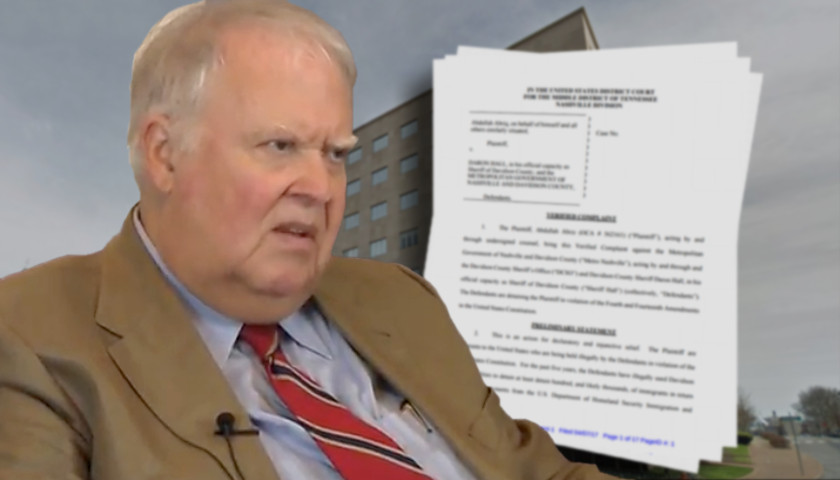On April 7, 2017, Nashville pro-illegal immigration activist lawyers Elliot Ozment, J. Gerard Stranch, IV, Tricia Herzfeld and Anthony Orlandi, sued Metro Nashville, Davidson County and its Sheriff Daron Hall, on behalf of Saudi national Abdullah Abriq, a student visa overstayer, and the “hundred and likely thousands of immigrants” subject to detainer requests issued by Immigration and Customs Enforcement (ICE).
The open borders lawyers attempted to use Abriq’s lawsuit opposing his deportation to also challenge the deportation of illegal aliens who are arrested and subsequently held in the Metro jail on a request from ICE to detain the criminal for transfer to ICE custody pending removal proceedings.
This time around however, it is score one for the rule of law and zero for the four lawyers trying to protect illegal aliens.
Abriq was identified in the lawsuit as a “foreign national who immigrated to the United States under an F-1 student visa.” The F-1 visa is a type of non-immigrant visa that allows a person to be educated in the U.S. if they meet certain conditions. Absent an extension, the student must leave the country once the term or conditions of the visa expire. Visa overstayers are considered unlawfully present in the U.S. and can be deported.
Along with removing illegal border crossers, ICE is also responsible for removing visa overstayers, estimates of which range from 30-60% with student overstays constituting a considerable portion of this illegal immigrant population.
Relying heavily on a decision issued by the U.S. Fifth Circuit Court of Appeals upholding all but one part of Texas’ anti-sanctuary city law, the U.S. District Court for the Middle District of Tennessee reversed its earlier decision that Abriq’s detention in a Metro jail pending deportation, violated his Constitutional rights.
According to a press release issued by the Immigration Reform Law Institute (IRLI), their “friend-of-the-court” brief citing recent federal cases going against Abriq’s claims, caught the court’s attention:
The Immigration Reform Law Institute (IRLI) submitted a friend-of-the-court brief urging the court to change its mind in light of intervening appellate-court precedent, and the court did so. This time around, the court agreed with IRLI in recognizing that probable cause to believe that a crime had been committed is unnecessary in civil removal proceedings – which, to quote the court, ‘necessarily contemplate detention absent proof of criminality.’ The court also held that, as IRLI had pointed out, local officers were entitled to rely on federal authorities’ civil probable cause determination that the alien plaintiff in this case was present in the United States unlawfully. The court accordingly held that the alien’s detention comported with the Fourth Amendment, and dismissed his lawsuit.
Abriq was already in ICE’s custody when he was brought to the Metro jail. This is a slightly different situation than when a person is first arrested on local criminal charges and subsequently discovered to be an illegal alien, after which ICE may issue a detainer request “to take custody [from the local jailer] of a removable alien, already in state custody, when that alien is released from state custody.”
Regardless of this distinction, the Tennessee court acknowledged that “[t]he cases involving continued detention, pursuant to detainers and/or administrative warrants, of aliens already in state custody” are correct on federal immigration law.
The Fifth Circuit’s 2018 decision cited by the Tennessee court held that with regard to ICE detainers issued for criminals in state and local custody, Texas law enforcement could “comply with, honor and fulfill detainer requests.”
The Court also held that immigration officers may “seize” aliens based on an administration warrant attesting to the probable cause of removability (ie a detainer). As such, the Court determined that state and local law enforcement are not making any independent decisions about detaining someone but acting only when there has already been direction from the ICE agent who makes the underlying removability determination.
This specific part of the Texas case decision was cited by the Tennessee court in finding no constitutional violation in Abriq’s case.
The Tennessee court did not stop there but also included the Fifth Circuit’s reasoning under the “collective knowledge” doctrine, that the local law enforcement officer doesn’t need probable cause himself because the ICE officer’s knowledge passes to the local officer, “provided there is communication among the officers”:
‘[A] police force would not function without reasonable reliance on the statements and efforts of others.’ Liu v. Phillips, 234 F.3d 55, 57 (1st Cir. 2000). Local officials have the right to rely upon the federal law enforcement agency charged with the identification, apprehension and removal of illegal aliens from the United States.
Although not legally required, all detainers now issued by ICE for individuals arrested on local criminal charges must be accompanied by either: (1) a properly completed Form I-200 (Warrant for Arrest of Alien) signed by a legally authorized immigration officer; or (2) a properly completed Form I-205 (Warrant of Removal/Deportation) signed by a legally authorized immigration officer.
During the 2018 legislative session, the Tennessee General Assembly strengthened its sanctuary city law including compliance with ICE detainer requests.
– – –
Chris Alto is an investigative reporter at The Tennessee Star.






Common sense and the rule of law won out.
But what is driving the lawyers Elliot Ozment, J. Gerard Stranch, IV, Tricia Herzfeld and Anthony Orlandi to challenge our laws and change them via the courts instead of the vote of the legislature and Tennesseans vote? Is it the leftist ideology of open borders with one big happy global family or is it is the lure of Saudi money? Or both?
Getting mega rich off these people.